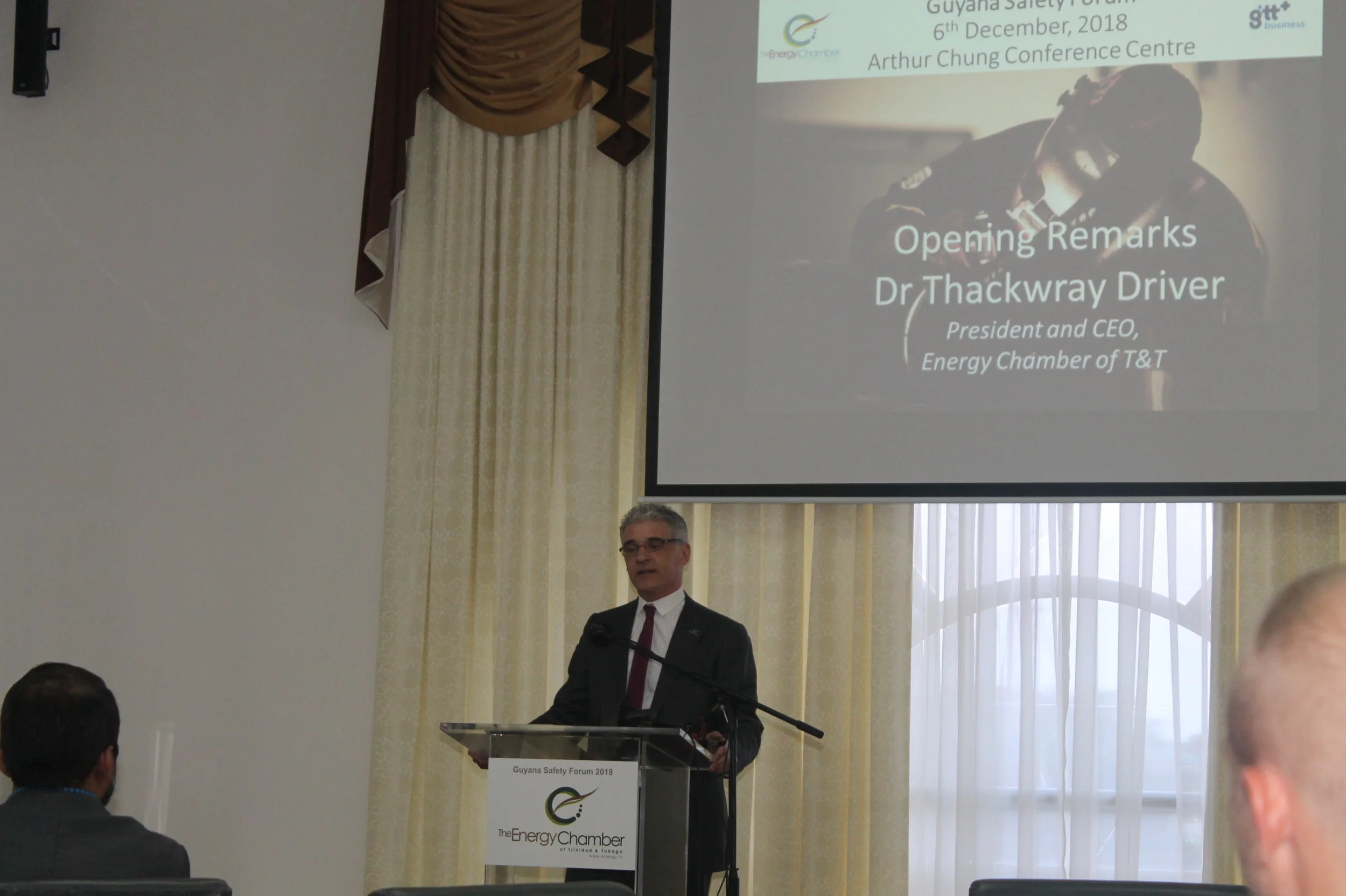In his first formal presentation to the annual Trinidad & Tobago Energy Conference, newly appointed Minister of Energy, the Honourable Stuart Young, told the energy industry that his focus was on bringing oil and gas resources to market as quickly as possible. Earlier in the day Prime Minister Keith Rowley said that the Government recognised given the energy transition was firmly underway, oil would probably have a shorter shelflife than natural gas. In line with this observation, Minister Young indicated that the Government was working with a horizon of 2028 to maximise oil production.
The Energy Chamber fully supports the privatization of the Pointe-a-Pierre refinery to put the asset to productive use. Significant capital investment is needed to bring the assets of the refinery back into productive and profitable use. This investment will need to be very carefully deployed and managed and there is significant risk involved. For this reason, the Energy Chamber is clear that no further Trinidad & Tobago tax-payers funds should go into this investment and that the capital must come from the private-sector. Given the size of the needed investment, the capital will likely be from an international investor, though local private-sector involvement would also be welcome. Click to read more…
Performance management (PM) can be a leverage point for change in Trinidad and Tobago as there is a gap between productivity and reward at the national level, which culturally and systemically infiltrates private firms and the public sector. The WEF (2017) reports ‘poor work ethic in national labour force’ as the most problematic factor for doing business in Trinidad and Tobago. Given this context, this article will explore how effective performance management systems can be used by organisations to close this gap.
BHP has indicated that Phase 3 of the deepwater drilling campaign in Trinidad and Tobago has been completed.
The Cassia Compression project will enable BPTT to access and produce low pressure gas reserves from currently-producing fields in the Greater Cassia Area, maximizing recovery from these existing resources.
Fifty per cent of energy services companies polled indicated that the value of their business was down in the second quarter of 2019. When asked for reasons that their value of business was down, all respondents indicated that it was due to a decrease in demand for their services. Other major reasons cited were less business opportunities and loss of contracts/projects. Fifty per cent of respondents also indicated that the volume of their business was down in the second quarter of 2019. Respondents indicated that this was due to a decrease in demand for their services and less business opportunities.
Compressed natural gas (CNG) is clearly expanding by any metric. At a recently concluded CNG Symposium and Open House organised by the NGC CNG, Curtis Mohammed, President of CNG NGC, provided an update on the CNG initiative. During the update, Mohammed provided some key statistics showing the uptake for CNG from 2014 to present.
Within recent times, the Venezuelan migrant crisis has dominated the international and local media. Over the past year in particular, there have been waves of arrivals of Venezuelans into Trinidad, driven in large part by the collapse of the economy and deteriorating living conditions. Many of them have sought employment in different areas of both Trinidad and Tobago. Given Venezuela’s global reputation as a major player in the oil and gas industry, there has been concern in some quarters about Venezuelans coming to work in the energy industry, particularly the petrochemical sector and displacing locals.
In a recent survey undertaken by the Energy Chamber of Trinidad and Tobago (Energy Chamber), it was revealed that late payments for work completed continues to occur. The respondents were all energy services companies that are currently engaged in work in the sector. Over 94 per cent of respondents reported that they have significant or very significant financial impacts due to late payments. In addition, almost 70 per cent of companies have reported that the situation has been getting worse over the last three years.
Every time that there are concerns expressed about the future of the oil, gas and petrochemical sectors in Trinidad and Tobago, there are responding calls for the diversification of the economy. These calls are understandable and appropriate, and fully supported by the Energy Chamber of Trinidad and Tobago (Energy Chamber). The Energy Chamber views economic diversification as a fundamental issue for our economy and especially the diversification of our exports. As a small open economy, Trinidad and Tobago needs to earn foreign exchange in order to survive and we can no longer rely upon exporting just a handful of energy related commodities.
With its recent 20th anniversary celebrations now in the proverbial rear-view mirror, liquefied natural gas (LNG) production company, Atlantic, is peering into the journey ahead and exploring how it will continue to navigate a very competitive global business.
On Thursday 9th May, 2019, Mr. Derek Hudson, Vice President and Country Chair of Shell Trinidad and Tobago Limited, signed the Safe to Work (STOW) Charter, demonstrating the Company’s commitment to the objectives of STOW. Also present at the signing which took place at the Energy Chamber of Trinidad and Tobago’s Executive Office were Dr. Thackwray Driver, President & CEO of the Energy Chamber of Trinidad and Tobago; Mr. Fitzroy Harewood, Chairman of the STOW Implementation Board and President of Pt. Lisas Nitrogen Limited and Mr. Eugene Okpere, Chief Operating Officer of Shell Trinidad and Tobago Limited.
If Trinidad and Tobago is going to make a success of the newly formed state oil company, Heritage Petroleum (Heritage), the Minister of Finance is going to have to follow through on his previous commitments to review the way in which Supplemental Petroleum Tax (SPT) is structured. The current way in which this tax against revenue is structured acts as a serious impediment to investment in the oil sector.
In an interview with Proactive Investors UK earlier this year, Chairman of Columbus Energy Resources plc (Columbus), Leo Koot, said that this was the year for which they have been waiting.
BHP has announced that it has found hydrocarbons in its latest deepwater well in Trinidad & Tobago’s deepwater block 23(a). The Bélé-1 well is the first of a three well programme to test prospects around the Bongos discovery, made in 2018. The well is being drilled by the Deepwater Invictus rig and was spud on 2 March 2019 in 2,102 meters water depth. The total planned well depth is 3,693 meters. The 31st March BHP operational review noted that drilling was still in progress.
BP Trinidad and Tobago (BPTT) today announced first gas production from its Angelin development. The project was delivered on time and under budget.
Fossil fuels are going to remain an important part of the energy mix for many years to come, but renewable energy is growing quickly. Trinidad and Tobago needs to be aware of this reality and embrace the global energy transition to a lowercarbon future. The energy transition is being driven not just by climate change policies, but also by technological innovation and the changing economics that the technological revolution has spurred.
If Guyana is to experience sustained growth leading to the development of a worldclass energy industry that benefits the local economy, it is critical that a robust safety culture is embraced now. Imperative would be the adoption of safety systems and procedures that international operators consider basic to a safe and productive operation. Adherence to such systems would also give locally owned and operated contractors greater access to work in the sector, which will enhance local content development.
The energy sector has predominantly had more males than females in senior roles. This is a global phenomenon and is not unique to Trinidad and Tobago. The International Energy Association (IEA) stated in an article in 2018 that the energy sector remains one of the least gender-diverse sectors, despite recent efforts to promote and encourage women’s participation. The IEA article alludes to inclusion of all human resources for key drivers of innovative and inclusive solutions.
The value and volume of business for energy services companies remain below normal. Fifty-nine per cent of energy services companies polled indicated that the value of their business was down in the third quarter of 2018.





















